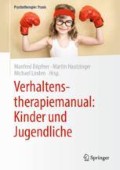Zusammenfassung
Neurofeedback zielt über die entwicklungsgerechte Rückmeldung von EEG-Signalen auf eine verbesserte Selbstregulation. Das Training basiert auf Prinzipien der Lerntheorie und umfasst auch Transferübungen zum Übertragen des Erlernten in den Alltag. Am weitesten verbreitet und am besten empirisch abgesichert ist die Anwendung von Neurofeedback als Baustein im Rahmen einer multimodalen Behandlung der ADHS. Neurofeedback soll nur mittels gut untersuchter Protokolle trainiert werden; dies sind insbesondere das Theta-Beta-Feedback und das Feedback der langsamen Potenziale.
Access this chapter
Tax calculation will be finalised at checkout
Purchases are for personal use only
Literatur
Aggensteiner, P.M., Brandeis, D., Millenet, S., Hohmann, S., Ruckes, C., Beuth, S., Albrecht, B., Schmitt, G., Schermuly, S., Wörz, S., Gevensleben, H., Freitag, C.M., Banaschewski, T., Rothenberger, A., Strehl, U., & Holtmann, M. (2019). Slow cortical potentials neurofeedback in children with ADHD: comorbidity, self-regulation and clinical outcomes 6 months after treatment in a multicenter randomized controlled trial. Eur Child Adolesc Psychiatry. https://doi.org/10.1007/s00787-018-01271-8. [Epub ahead of print].
Baumeister, S., Wolf, I., Holz, N., Boecker-Schlier, R., Adamo, N., Holtmann, M., Ruf, M., Banaschewski, T., Hohmann, S., & Brandeis, D. (2018). Neurofeedback training effects on inhibitory brain activation in ADHD: A matter of learning? Neuroscience, 378, 89–99.
Cortese, S., Ferrin, M., Brandeis, D., Holtmann, D., Aggensteiner, P., Daley, D., Santosh, P., Simonoff, E., Stevenson, J., Stringaris, A., & Sonuga-Barke, E. J. S. (2016). Neurofeedback for attention-deficit/hyperactivity disorder: Meta-analysis of clinical and neuropsychological outcomes from randomized controlled trials. J Am Academy Child Adolesc Psychiatry, 55(6), 444–455.
DGKJP et al. (2018). ADHS bei Kindern, Jugendlichen und Erwachsenen. S3-Leitlinie. www.awmf.org/leitlinien/detail/ll/028-045.html.
Holtmann, M., & Bölte, S. (2020). Neurofeedback bei Autismus-Spektrum-Störungen. In: U. Strehl (Hrsg.), Neurofeedback. Theoretische Grundlagen, praktisches Vorgehen, wissenschaftliche Evidenz. Stuttgart: Kohlhammer.
Holtmann, M., & Legenbauer, T. (2020). Weitere Therapieformen (Neurofeedback und Chronotherapie). In: H. Remschmidt & K. Becker (Hrsg.), Kinder- und Jugendpsychiatrie: Eine praktische Einführung. Stuttgart: Thieme. 511–517.
Sonuga-Barke, E. J. S., Brandeis, D., Cortese, S., Daley, D., Ferrin, M., Holtmann, M., Stevenson, J., Danckaerts, M., van der Oord, S., Döpfner, M., Dittmann, R.W., Simonoff, E., Zuddas, A., Banaschewski, T., Buitelaar, J., Coghill, D., Hollis, C., Sergeant, J., & European ADHD Guidelines Group (2013). Nonpharmacological interventions for ADHD: systematic review and meta-analyses of randomized controlled trials of dietary and psychological treatments. Am J Psychiatry, 170(3), 275–289.
Strehl, U., Aggensteiner, P., Wachtlin, D., Brandeis, D., Albrecht, B., Arana, M., Bach, C., Banaschewski, T., Bogen, T., Flaig-Röhr, A., Freitag, C. M., Fuchsenberger, Y., Gest, S., Gevensleben, H., Herde, L., Hohmann, S., Legenbauer, T., Marx, A.-M., Millenet, S., Pniewski, B., Rothenberger, A., Ruckes, C., Wörz, S., & Holtmann, M. (2017). Neurofeedback of slow cortical potentials in children with Attention-Deficit/Hyperactivity Disorder: A multicenter randomized trial controlling for unspecific effects. Frontiers in Human Neuroscience, 11, 135. https://doi.org/10.3389/fnhum.2017.00135.
Van Doren, J., Arns, M., Heinrich, H., Vollebregt, M. A., Strehl, U., & Loo, S. K. (2019). Sustained effects of neurofeedback in ADHD: A systematic review and meta-analysis. Eur Child Adolesc Psychiatry, 28(3), 293–305.
Author information
Authors and Affiliations
Corresponding author
Editor information
Editors and Affiliations
Rights and permissions
Copyright information
© 2020 Springer-Verlag GmbH Deutschland, ein Teil von Springer Nature
About this chapter
Cite this chapter
Holtmann, M., Legenbauer, T. (2020). Neurofeedback. In: Döpfner, M., Hautzinger, M., Linden, M. (eds) Verhaltenstherapiemanual: Kinder und Jugendliche. Psychotherapie: Praxis. Springer, Berlin, Heidelberg. https://doi.org/10.1007/978-3-662-58980-9_11
Download citation
DOI: https://doi.org/10.1007/978-3-662-58980-9_11
Published:
Publisher Name: Springer, Berlin, Heidelberg
Print ISBN: 978-3-662-58979-3
Online ISBN: 978-3-662-58980-9
eBook Packages: Medicine (German Language)

